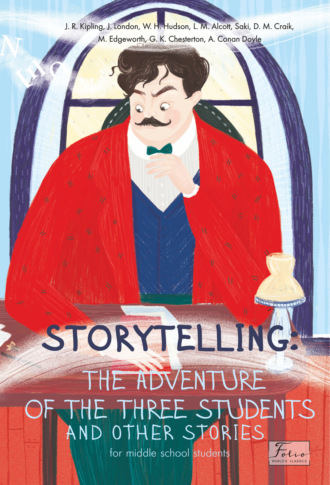
Полная версия
Storytelling. The adventure of the three students and other stories
“Maybe they’ve fell down a precipice and got killed, like Moses Warner, when he was lost,” suggested a tall fellow, who had shouted himself hoarse.
“Hush up, and come on! The dog is barkin’ yonder, and he may have found ‘em,” said the farmer, hurrying toward the place where the hound was baying at something in a tree.
It was poor Billy, hanging there still, half unconscious with weariness and fear. The belt had slipped up under his arms, so he could breathe easily; and there he was, looking like a queer sort of cone on the blasted pine.
“Wal, I never!” exclaimed the farmer, as the tall lad climbed up, and, unhooking Billy, handed him down like a young bird, into the arms held up to catch him.
“He’s all right, only scared out of his wits. Come along and look for the other one. I’ll warrant he went for help, and may be half-way home by this time,” said the hunter, who didn’t take much interest in the fat boy.
Tommy’s hat lay on the ground; and showing it to the dog, his master told him to find the boy. The good hound sniffed about, and then set off with his nose to the ground, following the zigzag track Tommy had taken in his hurry. The hunter and several of the men went after him, leaving the farmer with the others to take care of Billy.
Presently the dog came to the bear-pit, and began to bark again.
“He’s got him!” cried the men, much relieved; and rushing on soon saw the good beast looking down at a little white object in one corner of the dark hole.
It was Tommy’s face in the moonlight, for the rest of him was covered up with leaves. The little round face seemed very quiet; and for a moment the men stood quite still, fearing that the fall might have done the boy some harm. Then the hunter leaped down, and gently touched the brown cheek. It was warm, and a soft snore from the pug nose made the man call out, much relieved, -
“He’s all right. Wake up here, little chap; you are wanted at home. Had hunting enough for this time?”
As he spoke, Tommy opened his eyes, gave a stretch, and said, “Hollo, Billy,” as calmly as if in his own bed at home. Then the rustle of the leaves, the moonlight in his face, and the sight of several men staring down at him startled him wide awake.
“Did you shoot the big bear?” he asked, looking up at the hunter with a grin.
“No; but I caught a little one, and here he is,” answered the man, giving Tommy a roll in the leaves, much pleased because he did not whine or make a fuss.
“Got lost, didn’t we? Oh, I say, where’s Billy? I left him up a tree like a coon, and he wouldn’t come down,” laughed Tommy, kicking off his brown bed-clothes, and quite ready to get up now.
They all laughed with him; and presently, when the story was told, they pulled the boy out of the pit, and went back to join the other wanderer, who was now sitting up eating the bread and butter Mrs. Mullin sent for their very late supper.
The men roared again, as the two boys told their various tribulations; and when they had been refreshed, the party started for home, blowing the tin horns, and firing shot after shot to let the scattered searchers know that the lost children were found. Billy was very quiet, and gladly rode on the various broad backs offered for his use, but Tommy stoutly refused to be carried, and with an occasional “boost” over a very rough place, walked all the way down on his own sturdy legs. He was the hero of the adventure, and was never tired of relating how he caught the woodchuck, cooked the fish, slid down the big rock, and went to bed in the old bear-pit. But in his own little mind he resolved to wait till he was older before he tried to be a hunter; and though he caught several wood-chucks that summer, he never shot another harmless little bird.
Gipsy
by W. H. HudsonOn a fair Saturday afternoon in November Penrod’s little old dog Duke returned to the ways of his youth and had trouble with a strange cat on the back porch. This indiscretion, so uncharacteristic, was due to the agitation of a surprised moment, for Duke’s experience had inclined him to a peaceful pessimism, and he had no ambition for hazardous undertakings of any sort. He was given to musing but not to avoidable action, and he seemed habitually to hope for something which he was pretty sure would not happen. Even in his sleep, this gave him an air of wistfulness.
Thus, being asleep in a nook behind the metal refuse-can, when the strange cat ventured to ascend the steps of the porch, his appearance was so unwarlike that the cat felt encouraged to extend its field of reconnaissance – for the cook had been careless, and the backbone of a three-pound whitefish lay at the foot of the refuse-can.
This cat was, for a cat, needlessly tall, powerful, independent, and masculine. Once, long ago, he had been a roly-poly pepper-and-salt kitten; he had a home in those days, and a name, “Gipsy,” which he abundantly justified. He was precocious in dissipation. Long before his adolescence, his lack of domesticity was ominous, and he had formed bad companionships. Meanwhile, he grew so rangy, and developed such length and power of leg and such traits of character, that the father of the little girl who owned him was almost convincing when he declared that the young cat was half broncho and half Malay pirate – though, in the light of Gipsy’s later career, this seems bitterly unfair to even the lowest orders of bronchos and Malay pirates.
No; Gipsy was not the pet for a little girl. The rosy hearthstone and sheltered rug were too circumspect for him. Surrounded by the comforts of middle-class respectability, and profoundly oppressed, even in his youth, by the Puritan ideals of the household, he sometimes experienced a sense of suffocation. He wanted free air and he wanted free life; he wanted the lights, the lights, and the music. He abandoned the bourgeoisie irrevocably. He went forth in a May twilight, carrying the evening beefsteak with him, and joined the underworld.
His extraordinary size, his daring, and his utter lack of sympathy soon made him the leader – and, at the same time, the terror – of all the loose-lived cats in a wide neighbourhood. He contracted no friendships and had no confidants. He seldom slept in the same place twice in succession, and though he was wanted by the police, he was not found. In appearance he did not lack distinction of an ominous sort; the slow, rhythmic, perfectly controlled mechanism of his tail, as he impressively walked abroad, was incomparably sinister. This stately and dangerous walk of his, his long, vibrant whiskers, his scars, his yellow eye, so ice-cold, so fire-hot, haughty as the eye of Satan, gave him the deadly air of a mousquetaire duellist. His soul was in that walk and in that eye; it could be read-the soul of a bravo of fortune, living on his wits and his valour, asking no favours and granting no quarter. Intolerant, proud, sullen, yet watchful and constantly planning – purely a militarist, believing in slaughter as in a religion, and confident that art, science, poetry, and the good of the world were happily advanced thereby – Gipsy had become, though technically not a wildcat, undoubtedly the most untamed cat at large in the civilized world. Such, in brief, was the terrifying creature which now elongated its neck, and, over the top step of the porch, bent a calculating scrutiny upon the wistful and slumberous Duke.
Конец ознакомительного фрагмента.
Текст предоставлен ООО «ЛитРес».
Прочитайте эту книгу целиком, купив полную легальную версию на ЛитРес.
Безопасно оплатить книгу можно банковской картой Visa, MasterCard, Maestro, со счета мобильного телефона, с платежного терминала, в салоне МТС или Связной, через PayPal, WebMoney, Яндекс.Деньги, QIWI Кошелек, бонусными картами или другим удобным Вам способом.











